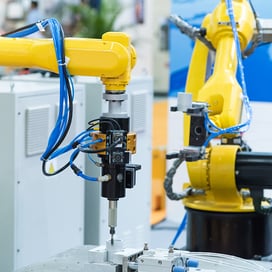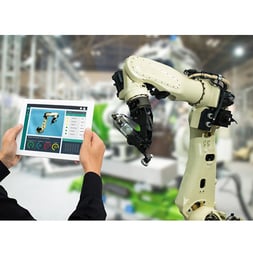 For those who are new to the world of robotic automation, it’s natural to ask why you should invest in this technology. Most business owners will want to fully understand the goals, the problems solved, the economic reasons, and the benefits of robotic automation before truly considering the investment.
For those who are new to the world of robotic automation, it’s natural to ask why you should invest in this technology. Most business owners will want to fully understand the goals, the problems solved, the economic reasons, and the benefits of robotic automation before truly considering the investment.
These concerns are heightened as robotic technology begins to penetrate more markets than ever before. RIA’s 2018 robot shipment statistics show exponential increases in robot shipments to non-automotive industries. Essentially, small and medium-sized businesses in a wide range of industries can now justify robotic automation after asking themselves, “Why should I automate?”
Investing in robotic automation is a big decision and there are many different ways to look at the reasons to automate.
The Goals of Robotic Automation
There are many different reasons why a manufacturer may choose to invest in robotic automation. Typically, robots address a business’s most pressing issues, including:
- Productivity and throughput
- Labor costs and shortages
- Floor space
- Product quality and consistency
- Product and process waste
- Traceability
- Safety
Robotic automation takes a manufacturer’s operations to the next level, increasing their competitiveness and profitability.
The Benefits of Robotic Automation
One of the most immediate benefits of robotic automation is its reliability and repeatability. Robots work tirelessly around the clock. They don’t take breaks or get distracted. The only downtime is when they need occasional maintenance. On top of this drastically enhanced uptime, robots are known for their precision, bringing a whole new level of consistency to production processes. In this way, robots can quickly improve product quality.
 Another immediate benefit of robotic automation is its traceability. Robots of all kinds have the ability to capture data at the production level for detailed analysis of processes. This kind of data collection facilitates ongoing productivity improvements, which not only helps maintain high productivity levels, it accelerates the return on investment (ROI) for robotic automation.
Another immediate benefit of robotic automation is its traceability. Robots of all kinds have the ability to capture data at the production level for detailed analysis of processes. This kind of data collection facilitates ongoing productivity improvements, which not only helps maintain high productivity levels, it accelerates the return on investment (ROI) for robotic automation.
Reliability, repeatability, and traceability are fundamental advantages robotic automation has over manual processes. However, there are many other benefits, as well as several other reasons why investing in automation gives manufacturers a competitive edge.
To learn more on this topic, read about the 5 Common Principles to Successfully Implement Industry 4.0
This article originally appeared on the Robotics Online Blog. Robotic Industries Association (RIA) is a part of the Association for Advancing Automation (A3), a CFE Media content partner.









